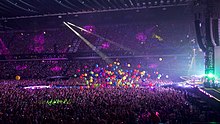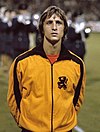|
Johan Cruyff Arena
The Johan Cruyff Arena (Dutch: Johan Cruijff Arena [ˈjoːɦɑŋ ˈkrœyf aːˌreːnaː]; officially stylised as Johan Cruijff ArenA) is the main stadium of the Dutch capital city of Amsterdam and the home stadium of football club AFC Ajax since its opening. Built from 1993 to 1996 at a cost equivalent to €140 million,[3] it is the largest stadium in the country. The stadium was previously known as the Amsterdam Arena (stylised as Amsterdam ArenA) until the 2018–19 football season, when it was officially renamed in honour of Dutch footballer Johan Cruyff who died in 2016.[4][5][6] It was one of the stadiums used during UEFA Euro 2000, and also held the 1998 UEFA Champions League Final and 2013 UEFA Europa League Final. The stadium also hosted three group stage matches and one match in the round of 16 of the UEFA Euro 2020. Both international and Dutch artists have given concerts in the stadium, including Tina Turner, Coldplay, U2, Take That, Celine Dion, Madonna, Michael Jackson, André Hazes, David Bowie, AC/DC, Justin Timberlake, One Direction, the Rolling Stones, Beyoncé, Rihanna, Taylor Swift and Armin van Buuren. The dance event Sensation was held in the stadium every year, up until the final edition in 2017. The stadium has a retractable roof and a grass surface. Since 2022, the stadium has a capacity of 55,865[1] during football matches, increased from 54,990.[2] The stadium has a capacity of 68,000 during music concerts if a center-stage setup is used (the stage in the middle of the pitch); for end-stage music concerts, the capacity is 50,000; and for music concerts for which the stage is located in the east side of the stadium, the capacity is 35,000. It held UEFA five-star stadium status, which was superseded by a new system of classification. HistoryThe Johan Cruyff Arena with the retractable roof opened and closed Amsterdam was one of six cities that bid to host the 1992 Summer Olympics. In 1986, a new Olympic stadium was designed, with a football field and an athletics track. It was to be built in the area of Strandvliet in Amsterdam Zuidoost. After Amsterdam lost the bid to Barcelona in October 1986, the plans for the new stadium were abandoned. In 1987, the Stichting Amsterdam Sportstad (English: "Amsterdam Sports City Foundation") was established, which made new plans for a sports stadium with an all-seated capacity of 55,000. In 1990, a new design was made based on both previous designs, with a football field, an athletics track, and completely covered by a roof. By this time, AFC Ajax needed a new stadium, as their previous home ground, De Meer, was far too small for most of Ajax's games. Since the late 1960s, Ajax had moved its most important games to Olympisch Stadion.[7] Indeed, from the 1930s onward, Ajax had played most of their European fixtures and midweek night games at Olympisch Stadion. Once more, the design was altered – the athletics track was removed, the capacity was reduced to 50,000 seats, and the fixed roof was replaced by a retractable roof. In 1992, the Government of Amsterdam authorised the plans for the stadium with a Transferium where people could transfer from their car to various forms of public transportation. In 1993, the Government of Amsterdam changed the development plan of the location and gave a permit to build the stadium.[7] The first pile of the deep foundation of the stadium was placed on 26 November 1993. The construction work, undertaken by Ballast Nedam and Royal BAM Group,[7] took almost three years. The highest point of the building was reached on 24 February 1995, after the roof construction was raised. The fly-over from the public road to the parking facilities was opened on 13 March 1996. The stadium received 180,000 visitors during the construction work, until the stadium was closed from 1 July 1996 until the opening ceremony.[7] The stadium was officially opened on 14 August 1996 by Queen Beatrix.[8] At the grand opening, the queen made a curtain fall inside the stadium. This revealed the world's largest painting De Zee (English: The Sea) of 80 by 126 meters (262 ft × 413 ft). Two-dimensional ships were placed on the sea representing the clubs in the Eredivisie. Trijntje Oosterhuis sang the hymn "De Zee", composed for the opening ceremony by John Ewbank. An eight-day torch relay with 375 runners over 1400 km through the Netherlands reached the stadium. The first runner was Johan Cruyff starting in the old stadium De Meer, and the last runner was Frank Rijkaard arriving in the new stadium. After the grass was revealed and the roof opened, an inaugural football friendly was played between AFC Ajax and Milan, which Ajax lost 0–3.[citation needed] Tina Turner opened the stadium with three concerts with 160,000 people, from her world breaking Wildest Dreams Tour. The construction of the stadium cost an equivalent of €140 million[3] (at the time, the currency of the Netherlands was the Dutch guilder). The stadium combines a retractable roof with a grass surface. This caused some problems in the beginning: the turf's grass would not grow in the shade of the open roof and had to be replaced up to four times a year.[citation needed] Exterior renovation In September 2015, plans were presented to renovate the stadium's facade.[9] The renovation should provide better quality and service to visitors by widening the walkway rings around the stadium, creating more room for the visitors and for new facilities (the number of seats remains the same). As a result, the outside of the stadium transforms from a concave shape to a convex shape, drastically altering its appearance. The renovation was completed in 2020, when four matches of the UEFA Euro 2020 championship were played in the Arena. Construction works started in June 2017.[10] The first phase is to renovate the east side of the stadium, where construction of the new facade was completed in April 2018.[11] Name changeOn 25 April 2017, it was announced that the Amsterdam Arena would be renamed to "Johan Cruijff Arena" in memory of Ajax legend Johan Cruyff.[12][13] Later that year, on 9 August, it was stated that the name change would take place on 25 October 2017.[14][15] However, this was postponed as that date proved to be infeasible due to the many matters that needed to be settled, such as arranging compensation for possible loss of income, transferring part of the shares from the municipality of Amsterdam to Ajax and having a discussion with the Cruyff family.[16][17] On 5 April 2018, it was announced that the stadium would officially change name at the start of the 2018–19 football season.[4][5] The stadium's new logo was revealed on 25 April 2018, the birthday of Johan Cruyff.[18] According to the spokeswoman of Cruyff's family, the original Dutch spelling of his name (Cruijff) was chosen for the stadium's official name "to stay close to the Dutch Johan".[6] The 2018–19 football season started in August 2018.[19] Building and facilitiesThe stadium's original architect is the Dutchman Rob Schuurman. The original all-seated capacity was 54,990.[2] After the 2019–20 season, but before Euro 2020, capacity was expanded by 660.[1][20] The final increased capacity after the 2017-2021 renovation project is 56,120,[1] an increase of 1,130. The original capacity during music concerts – the stadium's maximum capacity – is 68,000 visitors.[3] The parking capacity of the Transferium is 500 cars (inside); there are an additional 12,000 parking spots outside.[3] The Johan Cruyff Arena is one of two stadiums in the Netherlands that is rated as Category 4 by UEFA, the other being the Feijenoord Stadion in Rotterdam.[21] The Ajax Museum is located in the stadium, which shows Ajax's more than 120 years of history.[22] The nearest train and subway (metro) station is Amsterdam Bijlmer Arena. The metro lines 50 and 54 (Amsterdam Central Station and city center) stop here. Sporting eventsAssociation football
 The stadium is the home of AFC Ajax in the Eredivisie and European matches. The inaugural match on 14 August 1996 was a friendly between the home team Ajax and AC Milan, which ended with a 3–0 win for Milan. The first goal was scored by Dejan Savićević. The first Ajax goal was scored in the first competition match against NAC Breda by Kiki Musampa. The 1998 UEFA Champions League Final when Real Madrid defeated Juventus by 1–0 due to a goal by Predrag Mijatović, was played in the stadium. It was also one of the venues in UEFA Euro 2000. And the stadium was the host of the 2013 UEFA Europa League Final, when Chelsea defeated Benfica by 2–1. It hosts often Dutch national team's international matches, though the Netherlands does not have one dedicated national stadium for football. Since a friendly game in 2015, the stadium hosts regularly matches since 2023 of the AFC Ajax Women. The Klassieker home game against Feyenoord of that year was the first, with an attendance of 33,742 visitors. A year later the same game was played in the stadium aswel. And also the home games of the group stage of the 2023–24 UEFA Women's Champions League and the Quarter-final home game against Chelsea Women were venued at the stadium. The game against Chelsea saw a record attendance of 35,991 spectators for a women’s football game in the Netherlands. In addition, the stadium hosted pre-season friendlies of Ajax 1 (men) or in the past aswel tournaments, like the Amsterdam Tournament or games of Ajax's reserve team. Euro 2000
Euro 2020The stadium hosted three group stage matches and one round of 16 match at the UEFA Euro 2020, which was postponed to 2021 due to the COVID-19 pandemic in Europe. Also there was a smaller attendance because of this.
American footballThe stadium was home of the American football team Amsterdam Admirals of the NFL Europe, until the National Football League (NFL) ended its European competition in June 2007.[27] The team played over 50 matches in the stadium from 1997 to 2007.[8] World Bowl IX was played at the Arena in 2001, when the Berlin Thunder defeated the Barcelona Dragons. KickboxingAs kickboxing is a popular combat sport in the Netherlands, the It's Showtime and K-1 promotions have held a number of fight cards at the arena. Many of the sport's biggest stars such as Peter Aerts, Semmy Schilt, Badr Hari and Ernesto Hoost have fought there.[28] Music events
 Dutch music group De Toppers have played annually at the venue since 2005. In total, they have sold out more than 50 concerts; no other act has performed at the stadium that many times. The arena was listed as a potential venue in Amsterdam's bid to host the 65th Eurovision Song Contest. However, the city later withdrew its bid due to venues, including the Johan Cruyff Arena, being fully booked.[29][30]
See alsoReferences
External linksWikimedia Commons has media related to Johan Cruyff Arena. |
||||||||||||||||||||||||||||||||||||||||||||||||||||||||||||||||||||||||||||||||||||||||||||||||||||||||||||||||||||||||||||||||||||||||||||||||||||||||||||||||||||||||||||||||||||||||||||||||||||||||||||||||||||||||||||||||||||||||||||||||||||||||||||||||||||||||||||||||||||||||||||||||||||||||||||||||||||||||||||||||||||||||||||||||||||||||||||||||||||||||||||||||||||||||||||||||||||||||||||||||||||||||||||||||||||||||||||||||||||||||||||||||||||||||||||||||||||||||||||||||||||||||||||||||||||||||||||||||||||||||||||||||||||||||||||






